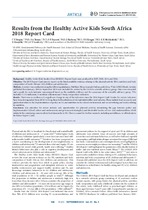Results from the healthy active kids South Africa 2018 report card
Abstract
Healthy Active Kids South Africa (HAKSA) Report Cards were produced in 2007, 2010, 2014 and 2016.
The 2018 Report Card aims to report on the latest available evidence relating to the physical activity (PA), nutrition and body
composition of South African (SA) children and adolescents.
A review was conducted using the following databases: PubMed; Africa Journals Online; and Africa-Wide (EBSCOhost). Articles
published from January 2016 to September 2018 were included for review by the HAKSA scientific advisory group. Data were extracted,
and a grade for each indicator was assigned based on the available evidence and the consensus of the scientific advisory group. This
included 12 PA indicators, 6 nutrition indicators and 3 body composition indicators.
There was no evidence of a significant change in any of the indicators since the 2016 Report Card. Grades for certain indicators
have been downgraded (from 2016) to bring these to the attention of relevant stakeholders and industry. These include food insecurity and
grades that relate to the implementation of policy on PA and nutrition in the school environment, and on advertising and media relating
to nutrition.
Key priorities for action include: safe opportunities for physical activity; minimising the gap between policy and
implementation (school culture and environment, and government strategies); and the double burden of over- and undernutrition, which
relates to the continuing concern about food insecurity in SA. There is a need for further research, including surveillance, on all indicators,
for future Report Cards.

